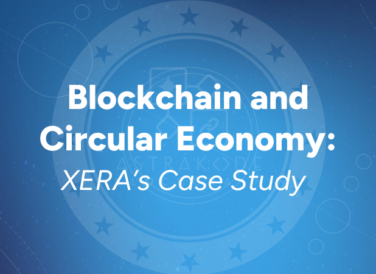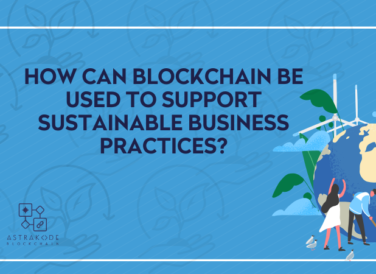
Blockchain and Circular Economy: XERA’s Case Study
In today’s fast-paced business world, staying ahead means embracing innovation and sustainability. XERA, an Italian…

As environmental, social, and governance (ESG) concerns have become increasingly significant in the business world, companies are exploring innovative solutions to incorporate sustainability into their operations. One such solution gaining traction is using blockchain technology for sustainability, also known as ESG blockchain. This article explores the potential of ESG blockchain in revolutionizing sustainable business practices.
Blockchain technology is a decentralized digital ledger that records transactions across multiple computers in such a way that the records cannot be altered retroactively without the alteration of all subsequent blocks and the consensus of the network. This technology underpins cryptocurrencies like Bitcoin, but its potential extends far beyond, influencing sectors ranging from finance to supply chain management, and now, environmental, social, and governance (ESG) criteria.
ESG criteria are a set of standards for a company’s operations that socially conscious investors use to screen potential investments. Environmental criteria consider how a company performs as a steward of nature. Social criteria examine how it manages relationships with employees, suppliers, customers, and the communities where it operates. Governance deals with a company’s leadership, executive pay, audits, internal controls, and shareholder rights.
Blockchain can significantly enhance environmental transparency by providing immutable records of environmental data. For instance, emissions data can be recorded in real-time, providing an accurate and tamper-proof record. This can help companies better monitor their environmental impact and enable regulators and consumers to verify a company’s environmental claims independently.
Blockchain promotes social responsibility by facilitating more decentralized business models. It empowers individuals and communities by enabling peer-to-peer transactions without the need for central intermediaries. This can help reduce poverty and boost local economies by allowing more direct access to markets and capital.
In governance, blockchain can offer new ways to ensure regulatory compliance through smart contracts. These self-executing contracts with the terms of the agreement directly written into code can automatically enforce obligations and penalties, reducing the risk of fraud and corruption.
Blockchain technology presents several compelling advantages for enhancing Environmental, Social, and Governance (ESG) solutions. Here are some of the key benefits:
By addressing these critical areas, blockchain technology not only supports but actively enhances the implementation and effectiveness of ESG solutions, making it a transformative tool for companies committed to sustainable and ethical operations.

Blockchain technology is being actively implemented across various sectors to drive Environmental, Social, and Governance (ESG) initiatives. Here are some compelling real-world applications:
WePower is a notable project that uses blockchain technology to enhance the transparency and efficiency of renewable energy trading. It allows renewable energy producers to tokenize their energy output, which can then be traded or sold. This system not only streamlines the process of buying and selling green energy but also ensures that the data regarding production and transaction is transparent and immutable, promoting trust among consumers and investors.
? For more details, you can read the WePower Review: Green Energy Trading on the Blockchain by Steve Walters
XERA, an Italian company focused on the circular economy, is making significant strides in the refurbishment of electronic devices using blockchain technology. By partnering with AstraKode, XERA has integrated blockchain to track every step of the electronics refurbishment process. This system ensures unparalleled transparency and builds trust by providing verifiable proof that the devices are refurbished according to sustainable practices. This initiative not only supports environmental sustainability but also sets a new standard for transparency and trust in the refurbishment industry.
? For more details on the XERA case study, visit the full article: “Blockchain and Circular Economy: XERA’s Case Study”
Another impactful application of blockchain in ESG initiatives is De Beers Group’s use of blockchain to trace diamonds from mine to retail. Their platform, Tracr, provides a secure and transparent record of a diamond’s journey, ensuring that every stone is ethically sourced and conflict-free. This use of blockchain enhances consumer confidence by guaranteeing that the diamonds are sourced following stringent ethical standards, thereby supporting both social and environmental aspects of ESG.
? For more details visit Tracr official website
Adopting blockchain technology poses technical challenges, such as scalability and complexity. Scalability remains an issue as many blockchain networks struggle to handle large volumes of transactions efficiently, which can hinder the effectiveness of blockchain applications in large-scale enterprise environments. Additionally, the technical complexity of developing blockchain solutions can be a significant barrier, especially for organizations without specialized knowledge in this area.
AstraKode Blockchain (AKB) addresses these challenges by providing a web-based low-code platform that simplifies the development of blockchain applications. This platform makes it easier for non-experts to build custom blockchain solutions, enhancing accessibility and reducing development costs, thereby facilitating the broader adoption of blockchain for various applications, including ESG initiatives.
Discover how AstraKode Blockchain can streamline your ESG efforts. Register for free today and start building custom blockchain solutions easily!
Blockchain’s decentralized nature presents ethical and social challenges, especially regarding regulation and control. The potential for anonymity and the irreversible nature of blockchain transactions can create conflicts, particularly in corporate environments where transparency and accountability are paramount. Moreover, the decentralization can complicate regulatory oversight and control, posing risks like non-compliance with existing laws and standards.
To address these issues, blockchain networks can be designed with “permissioned” layers, where transaction visibility can be controlled and adjusted according to regulatory requirements and corporate policies. This approach balances the benefits of decentralization with the need for transparency and accountability. Additionally, developing standard protocols and cooperating with regulatory bodies to craft blockchain-friendly regulations can help mitigate these risks, ensuring that blockchain aligns with ethical and social standards required by corporate governance.
The integration of blockchain technology into ESG strategies represents a significant step forward in ensuring corporate accountability and sustainability. By providing immutable records, enhancing transparency, and supporting decentralized business models, blockchain holds the potential to transform how companies meet their ESG commitments. As the technology continues to evolve and overcome current challenges, its role in shaping the future of sustainable business practices looks increasingly promising.

In today’s fast-paced business world, staying ahead means embracing innovation and sustainability. XERA, an Italian…

Sustainable business practices are vital strategies that companies adopt to benefit society, the environment, and…

A circular economy aims to eliminate waste and maximize the continuous use of resources. This…